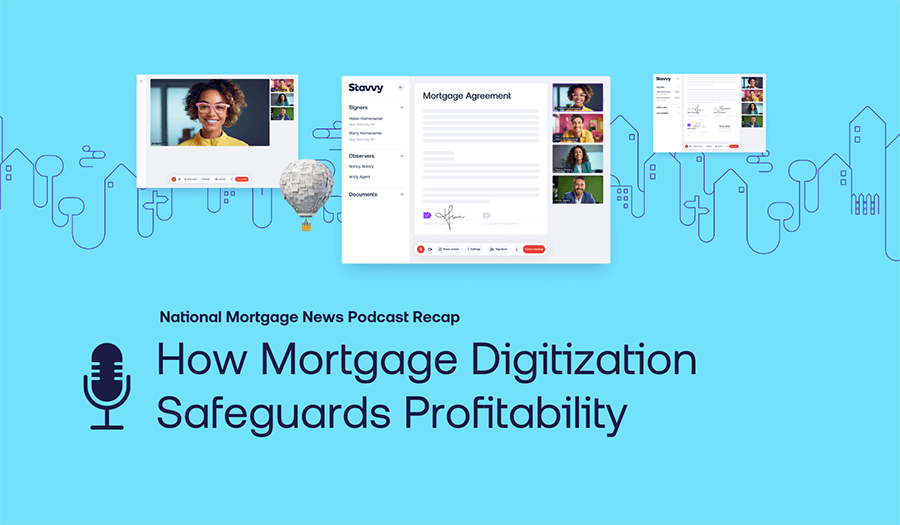Innovation is transforming the title insurance industry, and more change is on the horizon.
Monumental digital mortgage milestones include an uptick in eClosing adoption among title and settlement professionals, widespread remote online notarization (RON) state legislation, and momentum for the SECURE Notarization Act in 2022.
Based on this progress, we think it’s fair to say that the next few years will be centered around a similar theme: the intersection of title insurance technology and policy.
Steve Gottheim, General Counsel for the American Land Title Association (ALTA), agrees.
“We see more and more of that push to make [the mortgage closing process] more collaborative with technology. The work of developing those technology standards, the work of technology coming in and pushing us together is only making us closer as a group of industries.”
- Steve Gottheim
Steve joined Jeremy Potter on Stavvy’s Finside Chats® podcast to provide a monster update on the title insurance industry. From the latest innovations to debunking common myths, discussing the collaborative role technology plays in residential real estate, and the latest on attorney opinion letters (AOLs), Steve covered it all and then some, sharing lessons along the way.
On this episode of Finside Chats®, you’ll learn about:
- Shocking misconceptions about title insurance technology
- How regulations and technology bring the title, real estate, and mortgage industries together
- Recent conversations with lawmakers, policymakers, and GSEs on homeownership equality
- AOLs replacing title insurance policies
Listen now: Lessons in Innovation from the Title Insurance Industry
Title insurance technology myths and misconceptions
Some homeowners and mortgage industry professionals think that title insurance is as easy as researching a property record with an Advanced Search on Google.
However, the reality is far more complicated. The title industry's complexities have been the driving force behind widespread technology adoption among title insurance companies and agencies.
This is ironic when you consider what Steve perceives as the two biggest myths in the title industry today.
- Title insurance is easy.
- The title industry is not technologically savvy.
Title industry partners, like homeowners, referral sources, real estate agents, and lenders, have varying insurance needs, requiring agents to stay agile and flexible when fielding various conditions and stakeholder requests for every transaction. Steve shares that title insurance technology has been and continues to be the perfect support for agility, scalability, and efficiency in the industry.
“I like to think of our folks as very highly skilled ninjas because they're able to meet and do so many things with a whole host of different environments in front of them—depending on where their deal is located, what the terms of the deals are going to be, etc. All of that is getting to the same goal: putting somebody in a home,” Steve said.
Due to the rise in digital mortgage technology providers, particularly eSign products and RON software, title agents are expected to work across and with multiple tools to close transactions for their partners. Crystalizing the industry’s dire need for an all-in-one platform equipped to tackle everything from title order requests to eSign, hybrid eClosing with IPEN, and full eClosing.
Additionally, with some of the property research at the county level happening electronically, title agents must do their best to review digital property records with varying degrees of data cleanliness.
“The reality is, we're only as good as the data we have available to us. The data in the 3,600 counties across the country that record property records and data is in varying degrees of digital access and digital availability,” Steve said.
However, Steve expresses that despite data gaps, multiple tools, and technological learning curves, the title insurance industry still views innovation and a paperless mortgage approach in a positive light.
“If you're in business today, and you don't ever feel the pressure to innovate and to find new technology and do things a little bit better, cheaper, faster, or all of that, you're probably in a weird place in the world,” Steve said.
Steve shares that the title industry has also been working to incorporate automated decision-making technology earlier in the title search process to better serve customers and partners.
“We saw the industry really rise to the occasion with the use of technology: automated decision engines, the ability to ingest title data and make an automated decision on which cases might need more work and which ones need a little less work,” Steve said.
Despite slow adoption in the real estate and mortgage spaces, the title industry's commitment to technology reflects its unwavering commitment to best serve its homeowners and partners and the recognition that technology enables, not replaces, their jobs.
Policy and real estate technology trends influencing the title insurance industry
In his 12 years working in Washington, D.C., Steve says he has noticed a growing interest in the title industry among policymakers, lawmakers, and GSEs. Most publicly, with the support of the SECURE Notarization Act and RON.
“[Policy makers] have a deeper understanding of what we do in terms of the title industry, our role, and how we operate,” Steve said.
But remote online notarization in the mortgage and real estate spaces is not the only topic of governmental conversation. Steve's latest discussions have revolved around a more intricate question: how can the residential real estate industry play a more prominent role in increasing homeownership representation?
Homeownership equality is a cause that, like technology innovation, brings the real estate and mortgage industries together, working towards a common goal for the betterment of communities.
“There are certainly policymakers at the GSEs, Fannie [Mae], and Freddie [Mac] that are trying their best to figure out—how do we help improve the ability of low and moderate-income people to become homebuyers?” Steve said.
“How do we get them educated the right way? How do we get them to understand what resources are out there?”
As demographics continue to shift, real estate professionals can expect to see a rise in business from Black, Asian, and Latinx populations and first-time homeowners.
“[This population] doesn't have the benefit of intergenerational wealth that has allowed people to become homeowners. They’ll need a little bit of a different level of service.”
Therefore, real estate, mortgage, and title professionals will need to plan to adapt their services to meet the unique needs of their customers. Digital mortgage technology, like eClosing and RON, is a great place to start because it allows the industry to provide flexible, remote options to their clients.
The title industry’s skepticism toward title insurance alternatives
Title agents have seen attorney opinion letters gain traction as an alternative to a full lender or owner title insurance policy. Steve warns the industry to approach this title insurance alternative with caution.
His concerns stem from the possibility of an attorney missing something during their search and exam process and the homeowner and lender not being adequately protected should something surface.
Human error or oversight during the title search can be costly. Gottheim estimates that the cost of defense for title actions can range from $15,000-$30,000. These costs would be covered by a traditional title policy but not by an attorney opinion letter.
“This is not something you want to DIY yourself,” Steve said. “That’s a little bit of what happens when you get pushed into using one of these attorney opinion letters. We’re concerned about it.”
The title insurance industry is rapidly advancing, and stakeholders have proven their ability to innovate and support new solutions. Digital mortgage technology and policy will continue to influence the title insurance landscape — but it’s clear that title professionals are embracing change with open minds and arms, setting them up for years of success.
Learn more about how the  is taking real estate beyond documents.
is taking real estate beyond documents.



![[Webinar Recap] Advancing Your Digital Default Servicing Strategy](https://blog.stavvy.com/hubfs/advancing-your-digital-default-servicing-strategy-blog-recap.png)